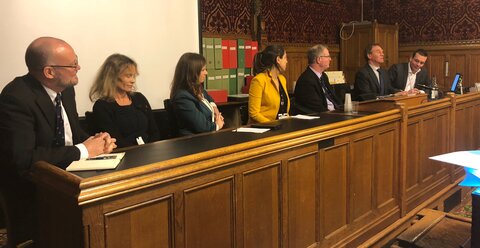All Party Parliamentary Group on Malaria and NTDS - Translating NTD Research into Policy

Panel discussion during the APPG chaired by Jeremy Lefroy MP
On 6th Feb a special joint event between the All Party Parliamentary Group on Malaria and NTDs and the LCNTDR was held at the Houses of Parliament to mark the 6th anniversary of the London Declaration on NTDs.
The meeting brought together parliamentarians, members of the House of Lords, researchers, donors and NTD stakeholders to discuss how research is strengthening the evidence base and helping policy makers to make informed decisions and policies
The presentations given can be downloaded below:
- Policy shifts from controlling morbidity caused by NTDs to interrupting transmission by mass drug administration - Professor Sir Roy Anderson, Director LCNTDR
Sir Roy provided an overview of how LCNTDR members were helping to define NTD policy. NTD research efforts are vital in identifying approaches not only to control diseases but to ultimately eliminate them by breaking the transmission cycle. To achieve this progress, new diagnostic and mapping tools will be key to detecting and targetting infections. He emphasised, as government NTD elmination programmes move to 'the end game' of elimination, there was a continued need for quality epidemiology studies to continue to inform and direct policy. Download the presentation.
- Economic evaluations of mass drug administration - Dr Hugo Turner, Head of Health Economics, Oxford University Clinical Research Unit in Vietnam
Health economist, Hugo Turner highlighted his research into the cost effectiveness of mass treatment programmes targetting parasitic worms. Using the example of the GPELF programme to control lymphatic filariasis, he calculated over $100 billion in potential economic loss had been averted by those treated by the programme. This represented an economic benefit of over 30 times the cost of the programme. His findings showed that treatment was extremely cost-effective but, to maximise this cost-efficiency, control strategies need to be tailored to local contexts. He emphasised that such findings were useful for policy makers in justifiying continued investment in NTD control. Download the presentation.
- Leaving no one behind in sleeping sickness elimination: Opportunities and gaps within Uganda’s integrated refugee policy - Dr Jennifer Palmer, Deputy Director of the Health Humanitarian Crises Centre, LSHTM
Jennifer Palmer presenting her work looking at the challenges of controlling sleeping sickness or human African trypanosomiasis (HAT) in fragile and forcibly displaced populations. Using the example of Uganda, she discussed the difficulties of coordinating national and NGO control efforts, diagnosising the disease and ensuring the ease of refugees' access to treatment within these environments. Her findings highlighted a clear governance gap in supporting the elimination of HAT within these communities. Download the presentation.
- Moving beyond school-based deworming: impact and implications of expanding treatment to communities in Kenya - Dr Catherine Halliday, Assistant Professor, LSHTM
Kate Halliday presented the findings of a large study to evaluate the impact and cost-effectiveness of community-based versus school-based mass drug administration (MDA) for soil transmitted helminths (STH) in Kenya. Over the course of the 3 year study, 423,000 community members were treated per MDA round and 66,978 individuals were surveyed at the beginning, middle and end of the study. The findings showed that community-wide treatment was more effective in reducing transmission than school-based treatment. Download the presentation.
- Breaking transmission of STH – the future of deworming - Dr Timothy Littlewood, Head of the Life Sciences Department, Natural History Museum
Building on the theme of strengthening the evidence-base to inform decision-making, Tim Littlewood presented the research approach of the Deworm3 project. This multi-partner, multi-country research project is seeking to demonstrate the feasibilty of interrupting STH transmission through MDA. The findings from this analysis will be used to recommend a feasible and effective approach for scaling up STH transmission interruption programmes. Download the presentation.
- Zoonotic schistosomiasis in Africa: the need for a One Health approach to schistosomiasis research and control in people and their livestock - Professor Joanne Webster, Professor of Parasitic Diseases, Royal Veterinary College
To tackle schistosomiasis Joanne Webster presented on the need to take a 'One Health' health approach includes treating both humans and livestock. Prof Webster highlighted her work on mathematical hybrid models which illustrate the role of livestock in ongoing human schistosome transmission. The evidence shows that livestock treatment regimes aren't being properly implemented resulting in potential zoontic reinfection risks for those communities in close proximatey to the animals. Download the presentation.
- Supply chain innovations: Improving the supply and coordination of donated products for NTD - Dr Mark Bradley, Director NTD, Global Health Programs GSK
To-date GSK have donated almost 8 billion tablets combat LF and STH. Mark Bradley discussed the work of the Supply Chain Forum to facilitate and improve the targetting and delivery of these tablets. The forum is a collation of partners engaged in the donation of NTD therapeutics and diagnostics. It also includes financing partners in the form of KPMG and logistics partners such as DHL. These partnerships aim to improve coordination, transparency and reduce supply costs. Download the presentation.